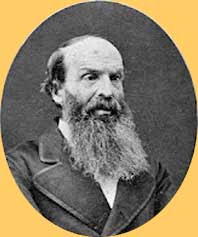This Day in Presbyterian History:
Missionaries Among the Nez Perce in the Northwest
 This nineteenth century missionary couple has been mentioned before in these pages in connection with Marcus Whitman on February 29 and August 18. They were Henry Harmon Spalding and his wife Eliza Hart Spalding. There were a number of “firsts” connected with both of them. Along with Mrs. Marcus Whitman, they were the first white women to travel on the Oregon Trail. Indeed, they were part of the first wagon train to travel on that famous trail. In the case of Henry and Eliza, theirs was the first white home in what is now Idaho. They brought the first printing press to the Northwest. But our interest in them was of far more importance than simply their being the “first” this or “first” that. They had a heart for the Nez Perce Indian people and their eternal souls.
This nineteenth century missionary couple has been mentioned before in these pages in connection with Marcus Whitman on February 29 and August 18. They were Henry Harmon Spalding and his wife Eliza Hart Spalding. There were a number of “firsts” connected with both of them. Along with Mrs. Marcus Whitman, they were the first white women to travel on the Oregon Trail. Indeed, they were part of the first wagon train to travel on that famous trail. In the case of Henry and Eliza, theirs was the first white home in what is now Idaho. They brought the first printing press to the Northwest. But our interest in them was of far more importance than simply their being the “first” this or “first” that. They had a heart for the Nez Perce Indian people and their eternal souls.
So after a very long and difficult trip by steamer, horse back, and wagon train, Henry and Eliza arrived at their place of work, settling in a house which they built, on November 29, 1836. Henry Spalding had unusual success in reaching this Indian tribe. He was able to give them a written script of their language, which enabled him to teach their tribal members. Spalding then translated parts of the Bible, including the entire gospel of Matthew. Leaders of the tribe were baptized, including the father of Chief Joseph, the brilliant military leader of the Nez Perce.
When the Whitmans and twelve of their followers were massacred in 1847, Henry was at that time on his way to meet them. He narrowly escaped in the five days journey back to his home, and eventually took his wife to Oregon City, Oregon to wait for the situation to simmer down. The Board of Missions which had sponsored them, however, decided to abandon the Mission Station.
Eliza would never see the region of the Nez Perce again, except after her death. Sixty years after her death, her body was interred on their land again beside that of her husband. Henry had ministered in various areas in the “civilized” northwest as a pastor and a commissioner of schools in what later became Oregon, until finally in 1859, he returned with delight back to his beloved Nez Perce. He would stay only a few years before difficulties arrived, and he died in 1874. He was buried on their land.
Words to live by: To go into uncharted territory with the Gospel is a worthy goal and takes an unusual kind of Christian. Henry Spalding was just such an individual. He knew his calling and wanted to waste no time in fulfilling it. And fulfill it he did. Along with the Gospel, caring for the souls of the Nez Perce, this missionary couple taught the tribe irrigation laws and the cultivation of the . . . potato! The next time you go to the store and buy some Idaho potatoes, think of Presbyterian missionary Henry Spalding!
Through the Scriptures: 2 Corinthians 10 – 13
Through the Standards: Instruction for participation in the Lord’s Supper
WLC 172 — “May one who doubts of his being in Christ, or of his due preparation, come to the Lord’s Supper?
A. One who doubts of his being in Christ, or of his due preparation to the sacrament of the Lord’s Supper, may have true interest in Christ, through he be not yet assured thereof; and in God’s account has it, if he be duly affected with the apprehension of the want of it, and unfeignedly desires to be found in Christ, and to depart from iniquity: in which case (because promises are made, and this sacrament is appointed, for the relief even of weak and doubting Christians) he is to bewail his unbelief, and labor to have his doubts resolved, and, so doing, he may and ought to come to the Lord’s supper, that he may be further strengthened.”
